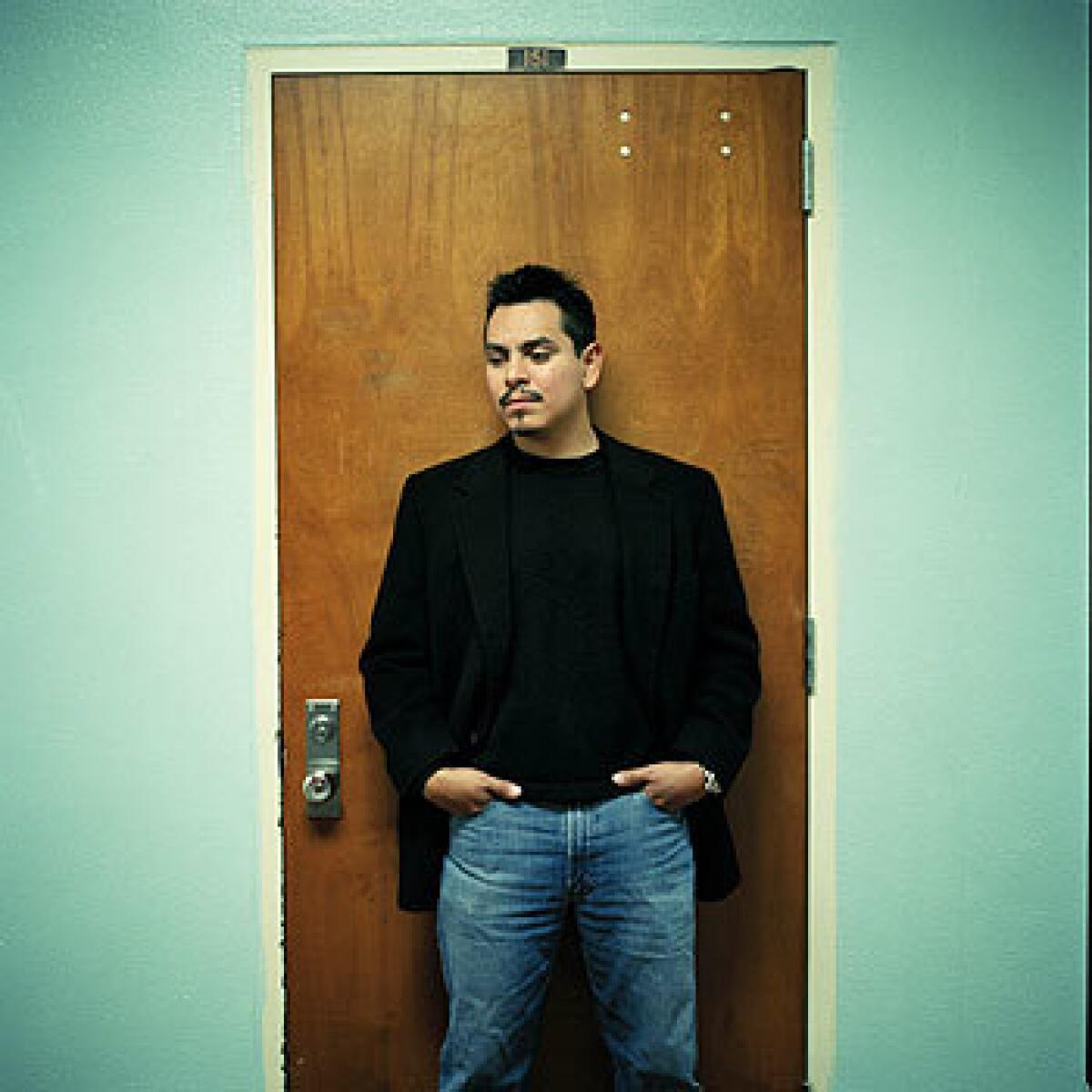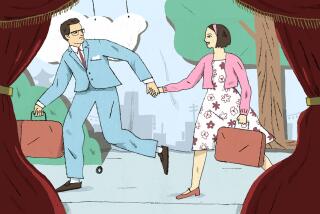Beginning a new chapter in his life

He told them about himself, how he had been like them. “I can help you,” he said, “I can help you.”
One slept. Others stared, bored.
He had planned today’s class carefully: His students would relate to him. They would ask his advice about college. Then he would divide them into teams and lead them in a tic-tac-toe spelling game.
They would compete fiercely. Excitedly.
A girl in the front row studied herself in the mirror of her compact. She ignored him.
This was Ricardo Acuña’s third week as a teacher. Day after day, it was growing more difficult. He gave the girl a tense look. Then he wrote her name in red on the board: detention.
“Mister! I wasn’t putting on makeup.” She slammed her books on her desk. Then she crossed her arms and slumped in her seat.
“If you have an education,” Ricardo told them all, “you can make a difference in your lives and your families’ lives.”
The hour passed without any sign that he was making much difference himself. When the bell rang, he forced a smile. “This isn’t me,” he told a visitor, as he gathered an armload of books and a brown briefcase stuffed with papers.
He walked down three flights of stairs to another classroom, where he would do the same thing all over again, with no better result.
It was starting to take a toll.
Ricardo Lira Acuña, 34, had counted on teaching to be satisfying, even inspiring. He was one of more than 200 interns hired each year by the Los Angeles Unified School District through a special program for mid-career professionals and college graduates without education credentials.
His wife, a teacher, had inspired him to set aside his desire to write full time so he could teach instead. He took six weeks of intensive training. Then, in August 2003, he went directly into a classroom at John Marshall High School in Los Feliz. Though he faced three more years of training classes at night and on weekends, he was now teaching English to kids he wanted to help.
He particularly had in mind kids who were like he had been: poor kids, struggling kids, kids on the margins. But he found problems he had never imagined. Some could barely read. Others were in trouble with the law. One was a mother whose boyfriend was in jail. Several were in gangs. A few were on drugs.
For new interns like Ricardo, guidance for handling such problems was limited. That July, L.A. Unified had discontinued mentoring for interns because of budget cuts. Marshall High School managed to continue the program for eight more weeks. But by the time Ricardo arrived, the mentoring of interns had been left up to four teaching coaches responsible for honing the skills of all the other 197 teachers at the school, as well.
Moreover, to Ricardo, asking for help would have been embarrassing. Instead, he struggled, fretting over what to teach and how to manage students. Paperwork choked him. The training classes drained him. Nightmares haunted him. He argued with his wife. But he had to admit, even to himself, that he had found something meaningful: the kids. Some he had grown to love.
Could he stick it out?
Would he be like the 68% of teachers hired by L.A. Unified in 1997-98 who were still in the classroom five years later? Or would he be like the other 32% who left, some for other school districts and others who quit teaching altogether?
Coming a Long Way From Humble Beginnings
Ricardo Acuña was born in Nogales, Ariz., on the Mexican border, a red-dirt town with blue hills and purple sunsets. His father was a migrant laborer who married, bought a mobile home in a trailer park and worked at produce warehouses. His hands, Ricardo would remember in a poem, were
caked with dirt,
maps with tiny roads of blood
from splinters and metal edges,
burned in the sun.
Frozen in the warehouse.
scented with tomates, calabazas,
pepinos, sandias,
mangos, jalapeños, aguacates,
berenjenas
melons, cerezas, limónes,
uvas
and other produce
you and I have eaten
without knowing by whose hand
we’ve been fed.
Ricardo’s parents sent him to a Catholic preschool and kindergarten, but then the money ran out. So he went to a public school, and his mother drilled him in the alphabet and arithmetic. By fifth grade, his academic resume had grown longer than hers. He took honors English and honors algebra. He idolized Alex P. Keaton, the Michael J. Fox character on “Family Ties” who yearns to go to Princeton.
A math teacher realized Ricardo was so bright that Princeton was no idle dream, and he introduced Ricardo to a businessman who helped him win a scholarship to Lawrenceville Academy, a prep school in New Jersey.
The fall before his junior year, his parents took him to the Tucson International Airport. In his suitcase, he carried two thin sweaters, a crucifix and a new calculator from his mother, though she did not want him to go; she said he was too young.
At Lawrenceville, many students wore crisp slacks, polo shirts and penny loafers. Ricardo wore blue shoes and his most expensive shirt from Kmart. His bare wood floor was cold at night, and he cried until the sun rose. He lost his calculator, got a D on his first English paper and called his father collect: He might not make it through the semester.
A fellow student helped him find winter boots and a rug for his frosty floor. Ricardo spent every night studying in his room or at the library. He got a B on his next paper. He graduated from Lawrenceville with a 3.7 grade point average and was accepted everywhere he applied, including Princeton, Harvard and Stanford. He chose Stanford because it offered him a full scholarship and the floors would not be so cold.
He completed Stanford with A’s and Bs, but he didn’t know what to do with his double major: French and English literature. So he went to Columbia University. He took out $70,000 in student loans and enrolled to study screenwriting. Three years later, he graduated with honors.
He wrote screenplays and poems, but he had to make a living, so he took odd jobs, first in Colorado, then in Los Angeles, where he typed letters and assembled reports for a consulting firm. It did not fulfill him. He went to work for the United Farm Workers union as its communications director, but it did not inspire him.
In 1999, he met Marvilla Bonilla, a Latina elementary school teacher with soft brown eyes and a smile like a Pablo Neruda poem. He wrote their love story in a screenplay he called “Love Curse.”
Ext. L.A. public library Downtown—day RITCHI So, what are you working on? MARVIE Oh, boring stuff. New bigger and better teaching theories. I’m always looking for a better way to teach these kids, to really reach them.
They married. To Marvilla, teaching was a passion, indeed a calling. She holds national board certification. Her dedication and her enthusiasm were inspiring. She was devoted to her students.
She told Ricardo that she held their lives in her hands.
Her enthusiasm was catching. He, too, would teach. Ricardo Acuña would be like John Keating, the English teacher played by Robin Williams in “Dead Poets Society.”
He would teach his appreciation of Charles Bukowski, John Fante and Jack Kerouac. Many of his students would value him, learn from him especially well, because they shared Latino roots.
He was one of them.
Struggling to Find a Common Language
That’s what we’re supposed to be doing: selling knowledge to kids — possibly the most finicky and reluctant of consumers. That’s the kind of teacher I’d like to be: A dramatic salesman! I’ve even thought about teaching class in a one-hour TV format with commercials and everything! Even pictured myself bouncing off the walls like Robin Williams. I personally want to be inspired and in turn inspire.— Ricardo’s journal
On July 17, 2003, after six weeks of training in how to make rules, plan lessons and organize classrooms, Ricardo faced his first class as a student teacher.
In front of him at Hollywood High School sat 20 freshmen, all Latinos. He asked them each to read aloud one by one from O. Henry’s classic Christmas story “The Gift of the Magi.”
He was startled.
Every one of them had trouble pronouncing the words. “I realized the reality,” he would say afterward. “Their skills are very low.”
It got worse.
They refused to pay attention. They pretended to work but didn’t. They hid their faces and threw paper at each other.
By the end of class, Ricardo felt defeated.
He was puzzled, too. I felt I would communicate better with them because I’m Latino, he thought. But they viewed me as a guest, as an adult. It almost seemed like being Latino didn’t count as much.
Two weeks later, still a student teacher, he was assigned to teach a class of seventh-graders at the Foshay Learning Center in South Los Angeles. At his gym the night before, he began planning in his mind. At home, he spent hours reviewing “That Was Then, This Is Now,” by S.E. Hinton, the book he would teach from. He spent another two hours outlining his material.
At 5:30 a.m., he woke and put on black Banana Republic slacks, a pressed white shirt and shiny black shoes. He drove his Hyundai Santa Fe to Foshay in time for the 7:25 a.m. bell.
“Good morning, class. My name is Mr. Acuña, with a tilde, that good old enya sound. I’m very excited to be here. We’re going to do a review of chapters 1 through 3 before we take the quiz. So can somebody please start by telling me what happened in Chapter 1?”
Silence.
Students glanced at each other. Some stared into their books, avoiding eye contact. A boy with curly hair sauntered in wearing a Rage Against the Machine jacket. He was five minutes late.
Ricardo tried again. “Why did it cause a problem to take that girl home?”
“Because she’s black,” someone murmured.
Ricardo was relieved.
“OK, she’s black. He’s white. There’s racial tension there.”
He turned to Chapter 2. He paced. Sweat beaded on his brow. “What do you what do you what does Cathy think about Mark? When, um when, um when they get to the dance?”
“She likes him,” somebody else replied.
“How do we know Bryon liked Cathy when he met her at the hospital?”
A girl in a pink sweatsuit spoke up. “He was stuttering.”
“He’s a lady-killer, right?”
Slowly, Ricardo loosened up. He began to praise freely. “That’s great you remembered that. That’s very interesting.”
In the back of the room, a reviewer for the intern program wrote into a spiral notebook: “He responds positively to students who are volunteering. He is providing a safe environment for the students so that they will have a comfort level that encourages their participation.”
The class recounted all three chapters successfully, took the quiz and made posters based on the book.
At 9:32 a.m., the bell rang.
“I enjoyed working with you guys,” Ricardo said. “You guys are great.”
*
Confronting Classroom Challenges
Today I learn myself anew, as a teacher, as a person . Am I ready for this? I have to be a model. Can I be effective, efficient, assertive, flexible, creative and passionate all at the same time?— Ricardo’s journal
Ricardo had been chosen from nearly 100 applicants to fill a full-time teaching position in Marshall High School’s English department. He was assigned five classes of freshmen and sophomores, some with 30 students each.
“A slam-dunk,” said Kristin Szilagyi, the department chairwoman. Because of his talent, education and ethnicity, “he just seemed perfect.”
Ricardo’s first day was Tuesday, Aug. 26. He planned it for hours. What to wear? Definitely a tie. How to greet them? Let them know he was the boss. Don’t smile. Activities? Make signs with the name of an author for each desk. Assign the author names to the students. Hand out a letter to parents.
He arrived at Marshall, a red brick building shaded by pine trees, an hour early. Ricardo wore the Banana Republic slacks that had seen him through his good day of student teaching. Against the wall of his classroom, he propped up his diplomas: Lawrenceville, Stanford, Columbia. On his desk, he put a picture of himself and Marvilla.
He printed his author names onto slips of paper and taped them to the students’ desks. William Shakespeare, Pablo Neruda, William S. Burroughs, Gabriel Garcia Marquez .
At 7:28 a.m., the bell rang.
Ricardo was ready.
As his students came in, most fixed their eyes on the tile floor. He shook their hands firmly, forcing them to look at him.
One greeted him nervously. She was Salvadoran. Her hair was long, brown and swept into a bun, and she had braces on her teeth. She studied him. She would remember the blurred outline of his black hair, his thin lips and his tie. She could not see his eyes.
“Good morning, my name is Mayra Ramirez,” she said softly, “and I have a problem with my vision. Do you mind if I sit up front?”
Ricardo looked through her glasses at her eyes. They were crossed. He nodded.
“Good morning, class,” he said.
Not a peep.
“I can’t hear you,” he said.
“Good morning,” they mumbled.
He introduced himself and then asked: “What does freshman mean?”
Silence.
“OK, I will pick someone. Is William Shakespeare in the house?”
A student in a corner raised his hand. “Being new.”
“Yes, that’s right.” On the board, Ricardo listed some synonyms: beginner, novice, newbie, frosh. His hands shook. He was conscious of his penmanship. Was it too slanted?
“School is your profession,” he said. “It’s your occupation. It’s your job. You should take pride in what you do.”
He raised a clenched fist in the air. That, he said, was his symbol for silence. “The reason I am choosing this signal is because it’s a symbol for power to the people.”
When class ended, he thought to himself:These kids aren’t so bad.
After three more classes, however, his eyes were watering, and his vision was clouded. His arms hurt from his shoulders to his hands, and his legs ached from standing. His tie felt tight.At 2:09 p.m., his last class arrived like an ambush.
They were sophomores. Some cursed. One called another an idiot. A large girl stretched her leg and propped a white tennis shoe on a desk across the aisle. Almost everyone chatted and laughed. Few paid any attention to Ricardo. One called his literary seat assignment a “silly little game.”
“All right,” Ricardo said. “I hear people talking. I don’t want anybody talking. I want you to be seated.”
He asked them to define sophomore.
A girl in a tight jean dress punched a boy sitting next to her. Ricardo saw it out of a corner of his eye. “Did you have a question?”
The boy shook his head. “No.” The girl tried to look threatening.
“Sophos = wise,” Ricardo wrote on the board. “Moros = dull, foolish.”
“So we’re smart idiots?” asked a baby-faced boy with tall ears, a shaved head and sagging pants.
“Yes,” Ricardo said. They had survived freshman year, “so you think you know everything. But you’re still learning. You’re still growing.”
He introduced himself and asked each of them to stand, in turn, and say, “Good afternoon, Mr. Acuña. My name is . “
“Oh, my God, do we have to?” someone asked.
The baby-faced boy with the tall ears complied. He was Latino and sat in the front row at the Charles Dickens desk. “Good morning, Mr. Acuña,” he said. “My name is Gusto.”
“Gusto, do you know what that means?” Ricardo asked.
Gusto shrugged, raising his thick brown eyebrows.
On the board, Ricardo wrote: “Gusto = passion for life, enthusiasm.”
Gusto smiled.
Ricardo said he would assign homework every day, including Fridays.
“Why?” asked a blond boy, who had introduced himself as Jeremy. He was the only white student in the class. He sat in front, at the Raymond Carver desk. He wore a T-shirt with Che Guevara’s face on it.
“I think it will be good for you,” Ricardo replied.
Jeremy pointed to one of the classroom rules, which Ricardo had written on the board. No eating, it said, or drinking, or chewing gum.
“Why no water?”
“There’s plenty of time to drink from the water faucets before and after class.”
When students performed well, Ricardo said, he would call their parents and tell them.
“Ugh. Why?” It was Jeremy again.
“For me as a teacher, it’s important to know your parents and who they are.”
“Isn’t that what back-to-school night is for?”
No other students had questioned Ricardo this much. He was growing flustered, and some began to giggle. He could tell that Jeremy was smart, curious and skeptical. Ricardo was put off, but intrigued.
He thrust his fist into the air for silence.
“Viva la revolucion!” Gusto said.
“Cesar Chavez, yes,” Ricardo replied. “I used to work with the farmworkers.”
Nobody responded. The class seemed unmoved.
Like a blessing, the bell rang. The students left, and then there was silence.
This class, Ricardo sensed, was going to test him.
More to Read
Start your day right
Sign up for Essential California for news, features and recommendations from the L.A. Times and beyond in your inbox six days a week.
You may occasionally receive promotional content from the Los Angeles Times.






